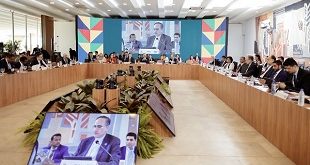
By Agnes E. Nantaba
If demarcation of Amuru land is good, involve people not army, says Uganda Land Alliance Executive Director, Edmond Malilo Owor. Five people were on Sept.8 seriously injured in clashes with security forces as they protested the opening of boundaries in Apaa parish, Paboo Sub-county, Amuru District. In the same area in Lakang village, the Madhivani group in 2006 proposed to secure 40,000 hectares for a sugarcane plantation. The government and the Madhivani claim the land in Amuru is `idle’ but villages say there are other ominous reasons why the government and other players are interested in the land. Edmond Malilo Owor, the Executive Director of Uganda Land Alliance (ULA), spoke to The Independent’s Agnes Nantaba.
What is the problem in Amuru?
The Amuru land case started after people were sent to the camps following two decades of civil war. The Acholi people say, ‘you sent us to the camps and now you are taking our land’. When people came from the camps, they could not trace their land and land grabbers have taken advantage of this. The Uganda Wildlife Authority appears suddenly and claims ownership of the land but people resist it. Their claim is without proof although they are determined to chase people out of the land.
In that struggle one person was killed. At one time crops were burnt and houses smashed but people still resisted. To them, there is a hidden agenda. They say by the time the people who want to evict them reach an extent of using security, it implies there is something big hidden behind the Amuru land.

Initially it was Lakang where Madhivani wanted to grow sugarcane. ULA, specifically I, was part of the team that wanted to convince those people to give in their land for sugar production but you could feel and see tension. After the RDC speaking for long, only one person spoke for only two minutes and the message was ‘why don’t you leave our land alone, what is the hurry about , does Uganda lack sugar, we don’t want the sugar, we are still recovering from the wounds of the war. The meeting could not continue. But other events like women undressing followed subsequently.
In fact for the Lakang case, a team went to Rwakitura after which some Indians were sent as fillers who were given only five minutes to go. They were referred to former MP Ochora’s land who was among the team that signed that the land had been given away to Uganda Investment Authority.
This implied that a few people could sign away land on behalf of the community. But there hasn’t been dialogue involving political leaders, opinion leaders, retired people who are resourceful and know the history of the area, religious leaders, and other stakeholders are equally important. There should also be documentation not just use of word of mouth.
And why should the demarcation be effected at this time? Demarcation is the first step that brings the border to Amuru side by over 20km which is a very long distance. The government claims that the people in Adjumani are involved in conflict and yet it has been confirmed that they are living peacefully because they know their boundaries.
Why is the government so interested in demarcating borders in Amuru?
Government claims the request to have the land demarcated was made by the local authorities but nobody in Amuru knows where that request came from although rumour has it that LC5 chairperson sent in the request. But should a few people decide on behalf of the entire community? Should this be a one man decision and if so, what is it based upon? In most of the districts in Uganda, there are no serious mark stones for Amuru to follow in the same spirit.
There are several conflicting versions of claims behind this land dispute. Sections of the community allege that a South African investor by the names of Martin Bruce has already acquired rights to their forests and grasslands for purposes of sports hunting and tourism although the Acholi leaders advised him to consider it a bad deal.
How do the wrangles impact on the system of land ownership in Uganda?
Despite the gaps in the laws, we have quite good laws to work with which only require implementation. Although there are gaps in the land tenure system in Uganda, the Amuru case is not about land ownership systems and more about impunity. The problem is that the laws have not been applied anywhere.
How can we have demarcation with soldiers deployed and people killed? What would happen if you left people live the way they have been living without the demarcation? We can say that there may be private interests involved.
What is the best way of resolving the issues in Amuru land?
Handling Amuru issues is a very simple issue. If we decide to go by the law, let’s get to the law books. There are provisions in the law that establish what or who owns that land. Establish ownership, if it’s UWA then they must produce evidence or if it’s owned by the Amuru community, then they should be involved in deciding what should be done with their land.
If there are any interested parties trying to acquire that land, there are lawful procedures to follow, but the most important issue is to promote the role of dialogue. Use people centered land governance so that if there are any investment intentions that call for displacement, there must be an agreed collective position that is discussed by all the stakeholders. The community must be adequately compensated after reaching an agreement. This must involve people who understand matters of the land and the law, compensation, and policy so that there is justice on all sides. People will then move on in a comfortable way.
There are traditional leaders who have always managed the land system and they have also never agreed to the terms. The same laws that are ignored are the same laws that will restore the land to actual owners. The Acholi say they are left with two options; either to withdraw and cry or get back violently. This is not just Amuru but a problem of the entire country.
Why has the issue of land grabbing come up at a time when development is being considered in most parts of the country?
The problem is not exclusive to Uganda but everywhere large scale land based investment is catching up across the world. The development dynamics across the world require that vast land for huge investments to take off. At the same time, land cannot be easily found in the sizes it is needed and when it is applied on a large scale it has to affect communities.
But while development must not be stopped, civil society across the world is only advocating for the respect of laws in terms of rights of people over their land. Acquiring land for any kind of investment is okay but how it is done becomes the problem. Are you compensating people adequately?
In some cases, they have promised people certain services in exchange for their land which never actualised. While we are now addressing the Amuru question, we are involving many other stakeholders across the world asking government to respect the land rights of their citizens.
How have entities like Uganda Land Alliance helped to effectively mitigate the problem in a way that promotes justice within the communities?
ULA does a lot of sensitisation to create awareness about the basics of land rights. We are also engaging leadership structures like local governments to build their capacity on how best to handle land disputes in their regions.
Our output is much more than what is found in the formal or legal systems framework because we prefer to solve issues by dialogue. Courts refer many matters to us for mitigation. We also work closely with government especially the land division and High Court to harmonise the informal and formal justice systems because there are many people with land conflicts who cannot afford the costs involved in court. There are minimal cases where we do litigation. We continue to work through the communities to inform people how they should respond to issues of land grabbing in a formal way. We did this is Karamoja in the marble mining areas where people were agreeably compensated.
How can we best integrate the provisions in the Uganda Land Policy into a conclusion that doesn’t negatively affect the parties involved?
The National Land Policy is comprehensive in matters of solving land matters. We are however in the process of engaging civil societies to distribute roles for the implementation of the provisions of the law in the coming year across the country. There are gaps like the failure to amend the Land Acquisition Act of 1965. But while the improvements on the law continue, we are working closely to ensure that the implementation of the present provisions is done in all parts of the country.
How far have you gone in your push to ensure the registration of communal land associations with the Ministry of Lands?
The associations were formed but the procedure requires them to be registered by the Ministry of Lands to allow them function legally. The little they are doing now is because they feel they cannot wait while their land is grabbed.
Our concern is that every single day that goes, there is land being grabbed somewhere and yet if they could register them, half of the cases would be avoided. We are however being promised that it is being addressed although we don’t have a statement on the exact position about registration of communal land associations.
What is your last word?
The rate at which land is being grabbed be it institutional, communal or individual land is alarming and calls for a quick response to address the issue because if it’s not done, we shall have ourselves to blame. Land is becoming smaller; population is increasing at the same time when land grabbers are enjoying security.
There is a big problem and the quicker we accept that there is a problem and provide a solution, the better future for this country. Members of parliament should know that before they rose to such positions, they were and are still land owners, but when the moment they fail to make it back and find their land grabbed, is the moment they will be able to tell the magnitude of the problem. The Amuru people have spoken so we should listen to them. If the question of demarcation is good, involve them not the soldiers.
 The Independent Uganda: You get the Truth we Pay the Price
The Independent Uganda: You get the Truth we Pay the Price



